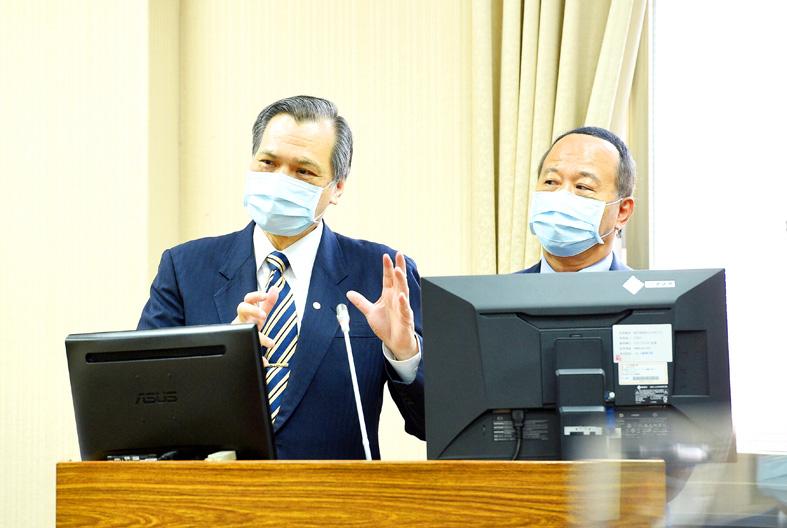It is “highly unlikely” that China would invade Taiwan this autumn, National Security Bureau (NSB) Director-General Chen Ming-tong (陳明通) told lawmakers yesterday, amid reports of a leaked Russian intelligence document suggesting that Chinese President Xi Jinping (習近平) is considering doing so.
“I believe this so-called leaked document is part of cognitive warfare targeting Taiwan,” Chen told a meeting of the legislature’s Foreign Affairs and National Defense Committee, but stopped short of naming China or Russia.
As the Chinese Communist Party (CCP) is scheduled to hold its 20th National Congress this autumn, the party’s main task is to maintain stability, Chen said.

Photo: Peter Lo, Taipei Times
It is therefore extremely unlikely that China would invade Taiwan at that time, he said.
Xi is widely expected to secure a third five-year term as the head of the CCP at the congress, and embark on a reshuffle that could see top party leaders replaced.
The alleged document was made public last week by Russian dissident Vladimir Osechkin.
According to the letter, which Osechkin said was from an intelligence officer in the Russian Federal Security Service, Xi was “considering taking over Taiwan in the fall ... as he needs his own little victory to get re-elected for a third term.”
However, “after the Ukrainian events, this window of opportunity has been closed” to Xi, which now gives the “United States the opportunity to both blackmail Xi and negotiate with its competitors on favorable terms,” the letter said.
The military said it has no comment when asked about the document.
Chen told lawmakers that the Russian invasion of Ukraine was a wake-up call for the democratic world to be more alert to the threats posed by authoritarian countries like Russia and China.
Unlike Europe and the US, which have an existing collective security system, East Asia does not have a similar mechanism and cannot mount a swift response if war breaks out in the Taiwan Strait, Chen said.
However, the US’ Taiwan Relations Act commits Washington to providing Taipei with the means to defend itself, which can serve as a legal basis for the US to assist Taiwan in case of a Chinese invasion, he said.
Chen added that he does not see China adopting a “reunification law,” as it would put too much pressure on Beijing to set a timetable for bringing Taiwan under its control, which could severely raise tensions.
China has not officially proposed such legislation, which would be a follow-up to its passage of the Anti-Secession Law in 2005 giving Beijing the legal basis for military action should Taiwan secede or consider seceding from China.
However, it has been discussed in state media. Asked about a political adviser’s suggestion that such a law be enacted, a spokesperson for China’s Taiwan Affairs Office last week said that it would “carefully listen to, and study opinions and suggestions.”
Adopting a reunification law would be “equivalent to setting a timetable,” Chen said. “In the past, during the Deng Xiaoping (鄧小平) era, they tried to set a timetable, but in the end thought it best not to, as it would put pressure on them.”
Additional reporting by Reuters

The Central Election Commission has amended election and recall regulations to require elected office candidates to provide proof that they have no Chinese citizenship, a Cabinet report said. The commission on Oct. 29 last year revised the Measures for the Permission of Family-based Residence, Long-term Residence and Settlement of People from the Mainland Area in the Taiwan Area (大陸地區人民在台灣地區依親居留長期居留或定居許可辦法), the Executive Yuan said in a report it submitted to the legislature for review. The revision requires Chinese citizens applying for permanent residency to submit notarial documents showing that they have lost their Chinese household record and have renounced — or have never

A magnitude 5.6 earthquake struck off the coast of Yilan County at 12:37pm today, with clear shaking felt across much of northern Taiwan. There were no immediate reports of damage. The epicenter of the quake was 16.9km east-southeast of Yilan County Hall offshore at a depth of 66.8km, Central Weather Administration (CWA) data showed. The maximum intensity registered at a 4 in Yilan County’s Nanao Township (南澳) on Taiwan’s seven-tier scale. Other parts of Yilan, as well as certain areas of Hualien County, Taipei, New Taipei City, Taoyuan, Hsinchu County, Taichung and Miaoli County, recorded intensities of 3. Residents of Yilan County and Taipei received

Taiwan has secured another breakthrough in fruit exports, with jujubes, dragon fruit and lychees approved for shipment to the EU, the Ministry of Agriculture said yesterday. The Animal and Plant Health Inspection Agency on Thursday received formal notification of the approval from the EU, the ministry said, adding that the decision was expected to expand Taiwanese fruit producers’ access to high-end European markets. Taiwan exported 126 tonnes of lychees last year, valued at US$1.48 million, with Japan accounting for 102 tonnes. Other export destinations included New Zealand, Hong Kong, the US and Australia, ministry data showed. Jujube exports totaled 103 tonnes, valued at

BIG SPENDERS: Foreign investors bought the most Taiwan equities since 2005, signaling confidence that an AI boom would continue to benefit chipmakers Taiwan Semiconductor Manufacturing Co’s (TSMC, 台積電) market capitalization swelled to US$2 trillion for the first time following a 4.25 percent rally in its American depositary receipts (ADR) overnight, putting the world’s biggest contract chipmaker sixth on the list of the world’s biggest companies by market capitalization, just behind Amazon.com Inc. The site CompaniesMarketcap.com ranked TSMC ahead of Saudi Aramco and Meta Platforms Inc. The Taiwanese company’s ADRs on Tuesday surged to US$385.75 on the New York Stock Exchange, as strong demand for artificial intelligence (AI) applications led to chip supply constraints and boost revenue growth to record-breaking levels. Each TSMC ADR represents